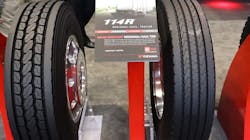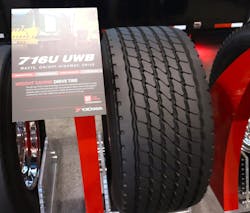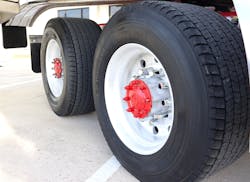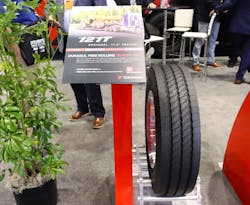ORLANDO, Florida—Yokohama Tire isn’t trying to fit round pegs into square holes.
Instead, the manufacturer is expanding its range of application-specific commercial tires designed to maximize fleet performance, rolling out the 114R regional-haul trailer tire during the American Trucking Associations’ 2023 Technology & Maintenance Council Annual Meeting at the Orange County Convention Center.
The new wear-resistant trailer tire features cut- and chip-resistant compounds, rounded shoulder ribs, and funnel-shaped step grooves that eject debris, helping protect retreadability—a key value proposition for all Yokohama’s tires.
“Coming off the success we had with the 114 ultra wide-base (UWB) regional tire, we wanted to create a regional tire for standard-size customers,” Tom Clauer, Yokohama’s commercial product planning manager, explained to Bulk Transporter. “So really the impetus for this tire was our desire to target the special needs of spread-axle trailers. They have very unique needs. With a spread axle, when you load the trailer, you end up with one axle that’s a pivot axle, and one that’s a slide axle, because they are so far apart.
“We designed this tire with a rounded outside shoulder rib that’s bolstered by the compound we use in it, so it can take that lateral slide.
“It’s not going to catch, grab, or grip—and it’s not going to tear.”
Yokohama also highlighted two recently introduced tires during TMC’s meeting, the 716U UWB and 121T—both launched in 2022—and the retreadability of its tires, and discussed recent trends impacting tire maintenance.
See also: More TMC 2023 coverage from Orlando
Application-specific design
The 716U UWB drive tire, launched in October 2022, is tailored for waste-hauling operations, completing Yokohama’s broad portfolio of ultra wide-base tires, which also are a favorite of liquid bulk haulers likeGroendyke Transport, which specs 902L UWBs on newKenworthtractors, Clauer said. “Bulk haulers are one of our biggest customer bases, especially fuel haulers,” he said. “They’ve been into ultra wide-base tires from the beginning, because they can load extra fuel on their trailers—and more payload means extra money.”The same theory applies to waste, recycle, and on/off-road severe service operations, where saving weight is critical. “With [the 716U’s] reliable all-season traction and durable construction, it really is the perfect drive tire for the job,” Dan Funkhouser, Yokohama Tire VP of commercial sales, said in a news release.
Fleets can save up to 800 lb. by replacing eight duals with four 716Us, Clauer said, increasing payload capacity and helping them compensate for the added weight that comes with battery-electric vehicles. “With the electrification of these trucks nowadays, the No. 1 concern is weight,” Clauer said. “So, if we can take 400 to 800 pounds off that tractor, that could be the difference between using a smaller battery vs. a larger battery, or maybe they can get more miles out of that charge by carrying less weight.”
The new 121T trailer tire, also launched last year, is targeted at drop-deck and heavy-haul trailer applications. The regional-haul tire features an increased speed rating, up to 68 mph, rigid shoulders, and severe-snow traction. “Now our friends in the Northern states can run through the slush, snow, and ice—and this tire will continue to track for them,” Clauer said.
See also: Tire outlook for 2023
Retreadability
Many people thought wide-base tires were a fad. That hasn’t been the case, and U.S. Tire Manufacturers Association (USTMA) data indicate fleets aren’t rushing back to duals, Clauer said. “Our ultra wide-base line has proven itself out,” he said. “This segment has stayed very stable.” In addition to their weight-saving potential, he credits the success of Yokohama’s ultra wide-base tires to their superior retreadability.
“These tires all have four steel belts, along with our zero-degree belt, so basically, we’ve got five steel belts on these tires,” Clauer said. “Do our tires weigh a little bit more? Yes, they do. But we can retread them over and over, and over again because durability is built in.” Zero-degree belts protect the casings by containing the higher air pressures inside wide-base tires—Yokohama’s show tires were set to 130 psi—which minimizes shoulder wear and evenly distributes heavy loads across the contact patch, increasing retread life.
“They’re like girdles that hold everything in,” Clauer said. “They’re not going to move.”
Yokohama’s ultra wide-base tires, with zero-degree belts, save fleets money, Clauer insisted. Instead of buying a new tire for $500, fleets can retread them for $200, and further extend tire life by moving them after each retread, from steer to drive, and drive to trailer. “There is a lot of opportunity for saving,” he said.
All Yokohama’s UWBs come with six-year, three-retread warranties.
“We guarantee we’re going to be able to retread that tire three times,” Clauer said. “We stand behind our tires.”
Tire trends
The growth of automatic tire inflation systems (ATIS), like Pressure Systems International’s (P.S.I.’s) Meritor Tire Inflation System or Aperia Technologies’ Halo Tire Inflator—now available for trailers with Halo Trailer Connect—further promote retreadability by eliminating underinflation, which is the leading cause of rubber on the road. ATIS also makes retreads safer for bulk haulers with sensitive tank trailer equipment.
“There’s a whole lot of technology going into these tires, so hopefully we’re going to eliminate those underinflated product issues,” Clauer said. New tire technology Yokohama is developing includes radio frequency identification (RFID). With RFID chips embedded in tires, fleets will be able to scan their unique serial numbers and upload them to their tire management systems for tracking “from cradle to grave,” Clauer said.
Yokohama also is seeing a rise in the adoption of last-mile delivery tires.
“Fleets have started to change their operations to adapt to modern distribution systems, so we’re seeing Class 8s go from one major DC to another major DC, and that’s about it,” Clauer said. “Then they move freight over to Class 7s, or even down to Class 6s, which are delivering goods to smaller DCs or the customers themselves.”
But the key trend now is the proliferation of electric vehicles—which boast more torque and heavier gross vehicle weights.
“That’s the major issue right now,” Clauer concluded. “These trucks are very heavy.”
Yokohama’s commercial tires at TMC included:
Steer/all-position and trailer:
- 114R, size 11R22.5
- 114R UWB, size 445/50R22.5
- 712L, size 295/75R22.5
- 504C, size 11R 22.5
- 505C, size 425/65R22.5
Drive:
- 716U UWB, size 445/55R22.5
- 902L UWB, size 445/50R22.5
- BluEarth 709L UWB, size 445/50R22.5
17. 5- and 19.5-inch
- 121T, size 215/75R17.5
- 124R, size 245/70R19.5
- 720R, size 225/70R/19.5
- 115R, size 225/70R19.5
- 714R, size 225/70R19.5
Light truck consumer:
- BluEarth Van A/S RY61, size 235/65R16C
- Geolandar A/T XD, size 275/65R18
This article originally appeared in Bulk Transporter, one of FleetOwner's sister publications.
About the Author

Jason McDaniel
Jason McDaniel, based in the Houston TX area, has nearly 20 years of experience as a journalist. He spent 15 writing and editing for daily newspapers, including the Houston Chronicle, and began covering the commercial vehicle industry in 2018. He was named editor of Bulk Transporter and Refrigerated Transporter magazines in July 2020.



